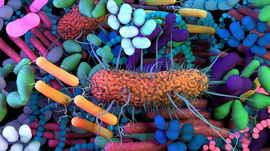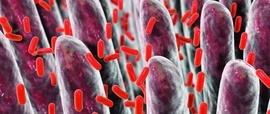Don't be arrogant and think your body solely belongs to you. You share it with... '39 trillion microbes'.
The human microbiome: Everything you need to know about the 39 trillion microbes that call our bodies home
Thousands of microscopic organisms share our bodies, influencing our behaviour in ways stranger than you could imagine.
What is the microbiome?
In any human body there are around 30 trillion human cells, but our microbiome is an estimated 39 trillion microbial cells including bacteria, viruses and fungi that live on and in us.
Due to their small size, these organisms make up only about 1-3 per cent of our body mass, but this belies the microbiome's tremendous power and potential.
We have around 20-25,000 genes in each of our cells, but the human microbiome potentially holds 500 times more.
Moreover, the ability of microbes to evolve quickly, swap genes, multiply and adapt to changing circumstances give them – and us, their hosts – remarkable abilities that we’re only now beginning to fathom.
Where is the microbiome?
The human body provides a broad range of environments, and microbes are capable of living in all of them.
Each part of the body is a different type of ecosystem, like a planet with different continents and climates, the inhabitants of which have adapted to the characteristics of each location.
Our faces and hands are dry and cool. They’re exposed to the elements, not to mention a constant stream of immigrant microbes every time we touch or come close to another thing.
Nooks and crannies like the armpits have a lot to offer bacteria, being moist, warm and dark.
The average human foot is even better, with 600 sweat glands per square centimetre – hundreds more than the armpits – that secrete a soup of salts, glucose, vitamins and amino acids, providing the perfect diet for a colony of bacteria.
Then there is the gut microbiome, where thousands of native bacteria live in partnership with us. They survive a hostile environment of darkness, high acidity and low oxygen, in what is a tumultuous river flushing through the stomach and intestines.
Where do these microbes come from?
Three-quarters of your microbiome can be traced back to your mother. The womb is a sterile place, free of microbes (at least we think so at the moment). But when we exit via the birth canal, we’re bathed in vaginal microbes.
This literal baptism of bacteria may be vital to a healthy start in life – babies who are born through caesarean section are more likely to develop allergies, asthma, coeliac disease and obesity later in life.
We also ingest around a million microbes in every gram of food, and our diet has a direct impact on which species thrive in our gut microbiome. If we change diets, from meat-eater to vegetarian, for example, the gut bacteria changes accordingly.

Enjoy being online again!
Welcome to the community of good people who base their values on evidence and appreciate civil discourse - the social network you will enjoy.Create your free account
Enjoy being online again!
Welcome to the community of good people who base their values on evidence and appreciate civil discourse - the social network you will enjoy.Create your free account









